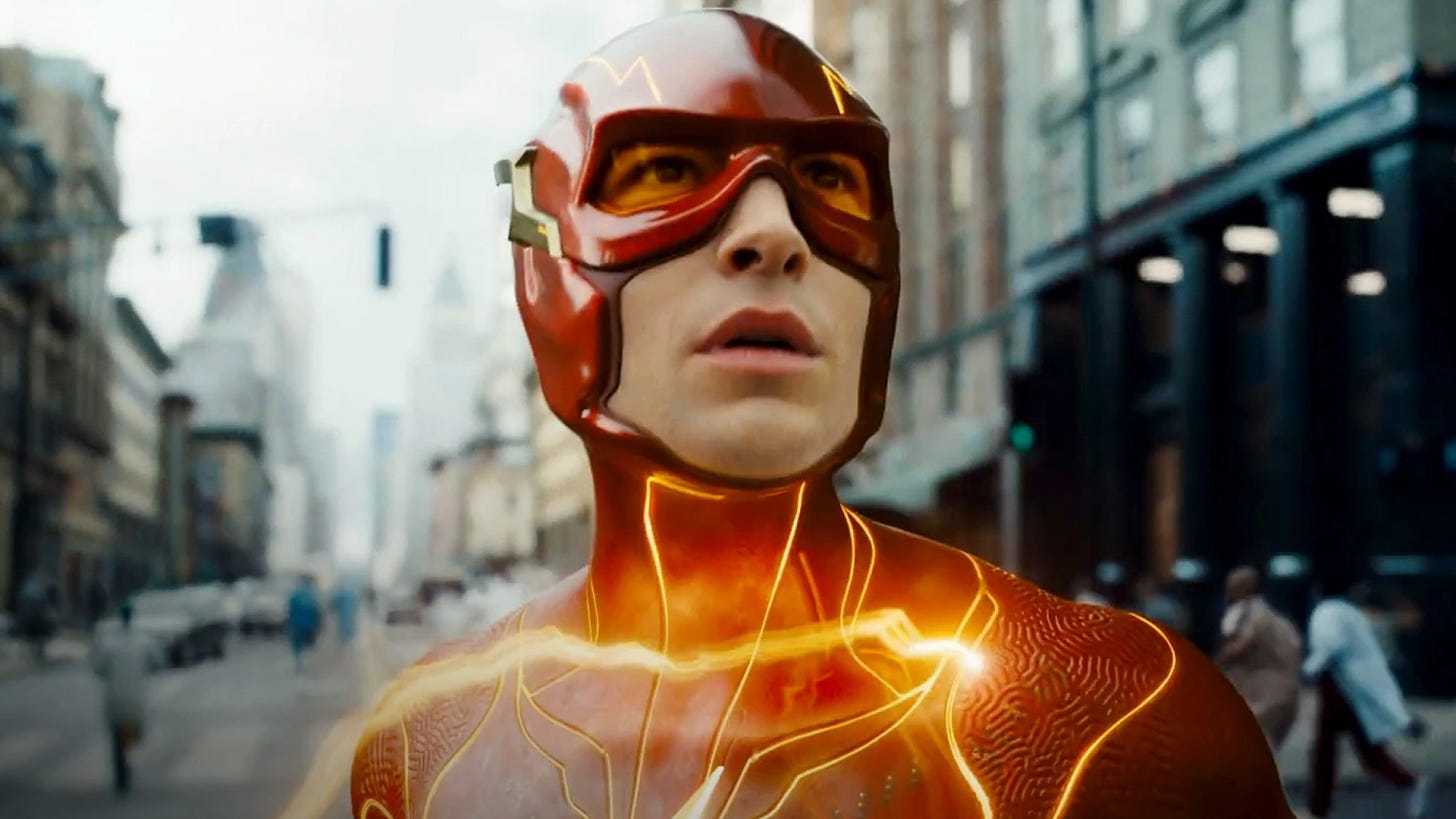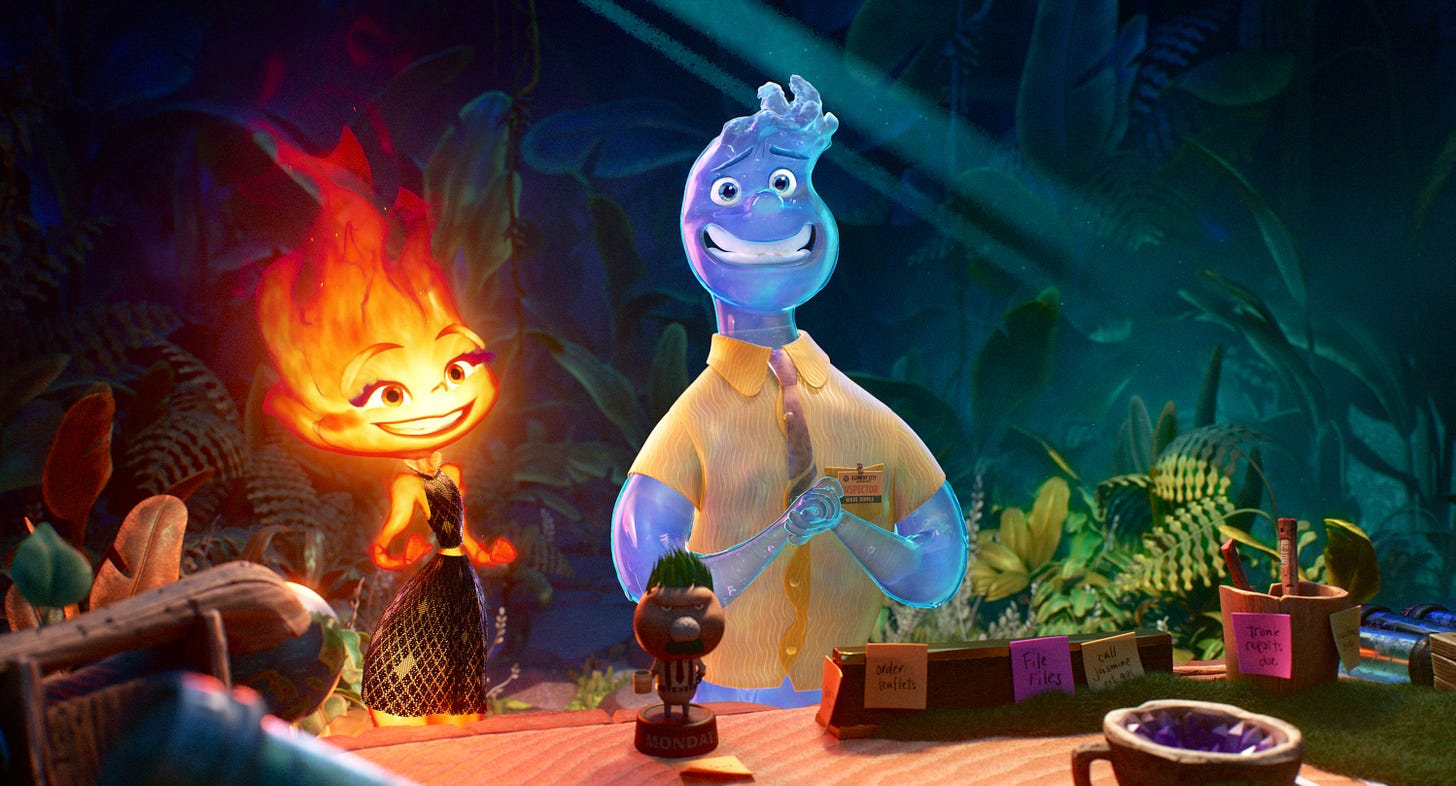In Review: 'The Flash,' 'Elemental,' 'The Blackening'
This week, the DCEU and Pixar head into a cruel summer and a low-budget horror-comedy makes certain that not all of its Black characters will be the first to die.
The Flash
Dir. Andy Muschietti
144 min.
In the best of the current wave of “multiverse” movies—basically the two animated Spider-Mans and the parts of Doctor Strange in the Multiverse of Madness that Sam Raimi was allowed to direct—there’s a genuine sense of boundless possibility, of alternate timelines and fantastical worlds flitting anarchically across the screen. But on the other end, there’s the danger of expansion seeming more like contraction, as properties nibble away at their own mythology and lean too hard into self-reference and fan service. These multiverses wind up feeling a little small, as if no good ideas exist beyond the surefire pleasures of the past.
People love Back to the Future. So why not turn The Flash, the thinking seems to have gone, into a de facto remake? Directed by Andy Muschietti (It) and written by Christina Hobson—whose solo writing credit cleans up a wild, years-long development process—the film springboards off the standard Barry Allen/The Flash premise that he can use his speed to bind time and would really like his slain mother to live. But as any time travel story will tell you, even the smallest change to the past can dramatically alter the future, and a mischief-making superhero is bound to cause more trouble than Marty McFly. So a tiny fraction of Barry’s time is devoted to saving his mother while the rest of it is spent cleaning up the temporal spaghetti that’s slipped through the colander of reality.
The concept has promise, both for opening up the DCEU to a refreshing screwball silliness and for serving as a kind of unofficial grand finale before the next, presumably much different phase of DC movies. (Perhaps Aquaman 2 or Blue Beetle will be more ambitious than I assume.) The most basic problem with The Flash: Ezra Miller is no Michael J. Fox. In a wink to the audience, much of the film takes place in an alternate timeline where Eric Stoltz, not Fox, was the star of Back to the Future—a cheeky reference to a real-life piece of Hollywood history. (Caring less about blockbuster casting issues is the sign of a true dystopia.) But Miller has a Stoltz problem, too, in that it’s quite possible to imagine a funnier, more energizing superhero romp if they were replaced by a more comically dextrous actor. Miller is more skilled at dead-eyed sociopaths.
The Flash opens with Barry as a Justice Leaguer of last resort, grudgingly going through the motions as a terrorist attack shakes the foundations of a hospital and he needs to save an entire maturity ward’s worth of newborns falling from the sky. (A cool idea for a sequence, spoiled by the janky CGI that plagues much of the film.) The source of Barry’s sour attitude remains the death of his beloved mother, a loss made more painful by the likely conviction of his father (Ron Livingston) for her murder. After discovering he can turn back time a little, Barry opts to turn time back a lot to prevent the incident from happening, but the time-jump has unexpected consequences, not least a reacquaintance with the goofy college-age version of himself. It would seem that in trying to fix one timeline, Barry has created a second timeline and both will have to get sorted out, whether his mom lives or dies.
The new timeline offers a familiar and delightful Batman in Michael Keaton, who helps Barry with great reluctance, and a cavalcade of other DC cameos, which are progressively less charming. The Flash benefits from a clean, engaging standalone story and a tone that’s pleasingly light for as long as it lasts, though Barry’s annoying try-hard aggressiveness occasionally grates on the nerves. But whenever Muschietti and Hobson reach for the grandiloquent and try to turn The Flash into the ultimate DCEU experience, the film gets gummed up in Easter eggs and some truly horrific CGI, much of it connected to a villain, General Zod (Michael Shannon), who seems like an afterthought. At the end of a messy phase of studio world-building from DC, it tries to take a bow for an encore it doesn’t deserve. — Scott Tobias
The Flash opens in theaters tonight and also opens several years ago in an alternate timeline.
Elemental
Dir. Peter Sohn
110 min.
It’s hard to figure out why Elemental isn’t a new Pixar classic. It looks great, from its endearingly realized characters to its towering cityscape. It’s driven by a clever concept that allows the film to offer commentary on an unmistakable theme. It sports an inventive Thomas Newman score and features a handful of moments sure to make even viewers not entirely in the film’s grasp grow a bit misty-eyed. Really, there’s nothing wrong with it. But there’s little that’s extraordinary about it, either, and extraordinary used to be the norm for Pixar. In some ways, the studio is the victim of the lofty expectations created by its earliest films, which might not be fair. Still, that makes it all the more disappointing when a Pixar release comes this close to matching the Pixar of old and doesn’t quite get there. And, to be clear, Pixar is still putting out great films, most recently last year’s Turning Red. It’s just the good-to-great ratio has started to skew in the wrong direction.
Directed by Peter Sohn (The Good Dinosaur), Elemental is set largely in Element City, where members of each of the four elements live side-by-side, if not always in perfect harmony. The allegory is admirably a little more complicated than a quick description suggests (even if it doesn’t benefit from intense scrutiny). Element City appears to belong to a functioning democracy, one complete with annoying layers of red tape. The opening lays out a history in which each element arrived at different points, and most residents enjoy a level of privilege that reflects the time their ancestors have been residents. Following a crisis in Fireland, the fire elemental family of Bernie (Ronnie del Carmen) and Cinder Lumen (Shila Ommi) attempt to make a new life for themselves in Element City. Like others of their kind, they settle into a run-down corner and help make it a fire-friendly neighborhood by opening The Fireplace, a general store/neighborhood hangout that serves up steaming Java Lava to happy customers.
Their daughter Ember grows up attempting to balance the traditions of her people with the possibilities of their new home. She’s expected to take over for her father when he retires and has no plans not to, despite a short temper and less-than-ideal customer service skills. Then a leak in the shop’s basement threatens its existence, bringing with it Wade (Mamoudou Athie), a sensitive city inspector who doesn’t want to report the Fireplace’s multiple code violations but feels he has to. As Ember tries to talk him out of it, they come to enjoy each other’s company. (It would be inaccurate to say sparks fly, but only because such a feat would be physically impossible for one of them.) In the tentative romance that follows, Wade has to deal with Bernie’s distrust of other elements (especially water) and Ember is forced to navigate the mix of good intentions and accidental cultural insensitivity offered by Wade’s well-heeled family.
It’s a clever set-up, but Element’s biggest problem is that it’s pretty much all set-up. The city’s a design wonder and it’s a pleasure to watch the characters wander through it, yet Ember and Wade are sweet but never particularly rich characters and their romance happens mostly because the film needs it to happen. What’s more, the cultural divide between them never seems that difficult to overcome. Elemental undeniably deals with prejudice and xenophobia but so vaguely and hesitantly that it barely registers. (It’s opposed to both, for the record.) It’s a perfectly pleasant, determinedly inoffensive movie that, unlike so many of its Pixar predecessors, almost seems designed to be forgotten.
Note: Elemental is preceded by “Carl’s Date,” a short film featuring Carl and Dug from Up in which, after a clever moment in which two dogs talk on the phone, not much happens. —Keith Phipps
Elemental opens in theaters tonight.
The Blackening
Dir. Tim Story
96 min.
The tagline for the horror-comedy The Blackening also doubles as the pitch: “We Can’t All Die First.” That’s a nod to the longstanding slasher trope that the Black characters tend to be the first to die, and so if you load up the entire ensemble with Black actors, only a Final Destination-style act of God could keep the convention alive. There are conceptual winks to other popular favorites here, too: The whodunit twists of Scream, the sinister gamesmanship of Saw, and the racially hostile terrain of Get Out, to name the most obvious touchstones. Yet it doesn’t feast on those references the same way as the asinine Scary Movie spoofs, but uses them more as the architecture for a raucous comedy that has a specific cultural agenda and plenty of other things on its mind.
A get-together for Juneteenth is the first indicator of where The Blackening might be headed. The second is a little harassment from a white ranger who’s surprised to learn that the owners of a spacious cabin in the woods would rent the space to eight or nine Black friends coming together for a college reunion weekend. The mayhem starts when the first two to arrive stumble down to the game room and discover the title board game sitting on a table like a racist Jumanji. When they start playing the game, they’re given questions from a grotesque Sambo-like centerpiece that threatens them with dire consequences if they get it wrong. Much like Jigsaw, the game delivers on its violent promises.
When everyone else arrives for a weekend of drinking, taking hallucinogens, and playing Spades, it’s not long before they get wrapped up in the game’s sinister machinations and a home that’s been booby-trapped to pen them in. The nature of the game, which poses questions about Black history and pop culture, gives The Blackening a comic boost, as its cast riffs hilariously on Nas lyrics, the number of Black characters on Friends, and the national importance of the O’Reilly Auto Parts jingle relative to “The Star-Spangled Banner.” The script, by Tracy Oliver and Dewayne Perkins (who also stars), may have Scream as one of its foundational pieces, but it’s more interested in deconstructing racial than the horror genre.
The liveliest scenes in The Blackening are the frenzied conversations the game forces these characters to have, including a running theme about the sensitive issue of “Blackness” and how they choose to define it. (In the 2018 short on which is the film is based, a psycho-killer agrees to murder whoever the group determines is “the Blackest.”) The main frustration with The Blackening is that Tim Story’s direction isn’t nearly as inspired as the script, despite a résumé of comic hits that includes Barbershop and all of the Think Like a Man and Ride Along movies. The Blackening needs to function as a horror film, too—Wes Craven was a big reason why the Scream franchise took off—but those elements seem like an afterthought, a disorganized jumble of jump scares and awkward blocking. It’s never a good sign when a movie leaves you thinking, “This would work much better as a play.” — Scott Tobias
The Blackening opens in theaters tonight.











Oof, three new movies reviewed and all of them get three stars? Looks like we're in the middle of a mid-June mediocrity slump! Thankfully I'm hearing very good things about Asteroid City, and Past Lives also goes wider this weekend.
awwww. disappointed to hear that about Elemental